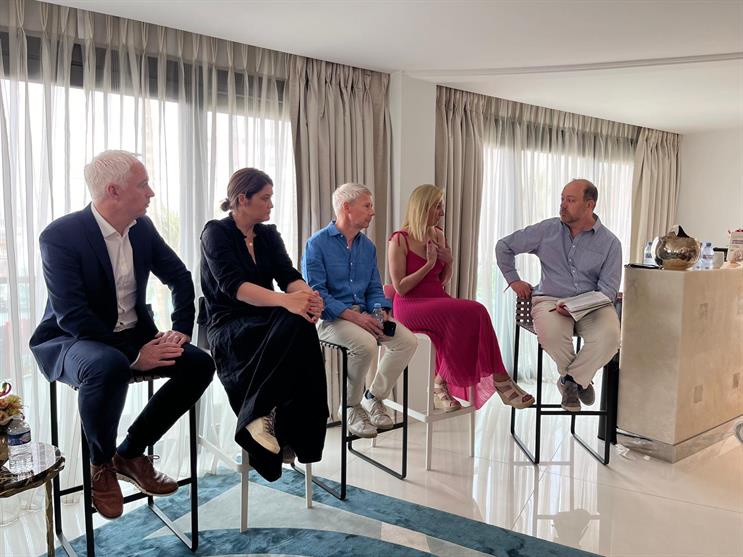
Marketing has a huge role to play in what Nick Purdon, a partner at Deloitte Digital, calls “the triple bottom line – people, planet and profit”.
This is a view Puja Darbari, managing director of the International Alliance for Responsible Drinking (IARD) echoes. Darbari introduced the session, setting out how the leading beer, wine and spirits companies are seeking to create systemic change within their sector and across the value chain to help reduce harmful drinking.
But there are contrasting views on which levers marketers can – or should – pull and how far along the journey the industry really is. An expert panel discussed…
Isabel Massey, global media director at Diageo, insists “we are beyond the point of questioning” whether responsibility is the new bottom line. “But it doesn’t happen overnight,” she added.
Fiona Lloyd, global brand president of Carat and dentsu’s exec sponsor of social impact, countered: “I don’t think we’ve yet convinced everybody in the industry that this really drives the bottom line.” Purdon adds. “There are short-term trade-offs in terms of delivering the bottom line while pivoting to a more responsible future. It’s not easy because it requires wholesale change throughout the organisation.”
Behavioural scientist Steve Martin remained equivocal. “Responsibility has an important role as a point of influence or differentiator but it’s not the only one. It’s not a replacement for making compelling products. It’s a route to building trust.”
1 Strategy: be clear, be imaginative
Lloyd described behaviour change as “the big bet” that takes “long-term commitment and investment”. That is why the work of organisations like IARD and Global Alliance for Responsible Media (GARM) is so valuable. “Bringing organisations together to enable those conversations is hugely powerful,” she said.
Lloyd explained that in the annual strategy planning that her agency does with clients, sustainable development goals (SDG) are prioritised.
“With great drinks comes great responsibility,” said Massey. “And our marketing strategies play directly into that idea.” Massey cited Guinness, which was recently announced as the official beer of football’s Premier League. By ensuring that Guinness 0.0 is as prominent at point of sale as the traditional alcoholic version, Diageo have combined responsibility and commercial success.
2 Collaboration: common language and approach
Massey described the likes of IARD and GARM, who deliver voluntary frameworks, as “centres of gravity” around which brands can congregate: “We're all in this together.”
But Purdon said: “You have to have relevant engagement with consumers. In retail banking our research shows consumers set a much higher bar in terms of trust. In beverages, it feels like the time has come for low and no alcohol. You have a whole generation of millennials and Gen-Z who are mindful drinkers. So there’s a real opportunity for responsible organisations like Diageo to leverage that and bring about positive societal change.”
3 Behave yourself: you can’t change as much as you think
The battle for hearts and minds? “Pretty much nonsense,” Martin said. Behaviour shifts change mindsets not the other way round. “It's hard to change people’s minds so let’s think about how we change behaviours, and minds will catch up. You [advertisers] are the triggers that unleash these motivations: the way a switch turns the lights on, not providing the actual power.”

4 Trusted voices: who influences the influencers?
Broadly the panel’s view was that the marketing industry is agile and often ahead of regulators. Massey said that “we should be taking responsibility for who we work with and what it means to be a trusted voice – the IARD principles help us to do this”
“We’re putting IARD's guidelines in place for the influencers that we work with,” said Lloyd, “and they’re at the same level as our compliance training because we feel it's that important.”
5 Lost in translation: cultural and political differences
“Just because something works somewhere in one country or one kind of culture doesn't necessarily mean that it’s going to work in another,” said Martin. “There needs to be flexibility and customisation. There’s a different reaction to loss of freedoms in Western individualistic cultures to that you’ll see in more collective cultures like Japan and south-east Asia.”
Purdon added: “Governments also have a critical role to play in driving positive behavioural change.”
6 Incremental change: what the future holds
“Responsibility is building a better world for the following generation – that’s the north star,” said Lloyd.
Martin queried: “Does the responsibility agenda potentially have an unintended consequence of crowding out smaller operators – responsibility sounds expensive.”
Puja Darbari, managing director at IARD, countered: "By working upstream with digital platforms, IARD has made it easier for all brands big and small to uphold standards of responsibility.
We're trying to bring through systemic changes to make it easier for all players to do the right thing."
The panel
Isabel Massey, global media director at Diageo; Fiona Lloyd, global brand president of Carat and dentsu’s exec sponsor of social impact; Nick Purdon, a partner at Deloitte Digital; behavioural scientist Steve Martin; Puja Darbari, managing director at IARD (as host).



